
October 17
1906 The Captain from Kopenik: Shoemaker leads German soldiers in a robbery:
Wilhelm Voigt, a 57-year-old German shoemaker, impersonates an army officer and leads an entire squad of soldiers to help him steal 4,000 marks. Voigt, who had a long criminal record, humiliated the German army by exploiting their blind obedience to authority and getting them to assist in his audacious robbery.
Wearing a captain's uniform, Voigt approached a troop of soldiers in Tegel, Germany, just outside Berlin and ordered the unit to follow him 20 miles to the town of Kopenik. After lunch, he put the men in position and stormed into the mayor's office. Declaring that the mayor was under arrest, Voigt commanded the troops to take him into custody. He then demanded to see the cash box and confiscated the 4,000 marks inside. The mayor was put in a car, and Voigt ordered that he be delivered to the police in Berlin.
On the way to Berlin, Voigt managed to disappear with the money. Still, it took more than a few hours at the police station before everyone realized that it was all a hoax. Although the Kaiser thought the story was funny, the German army didn't find it so amusing, and a massive campaign to find Voigt was instituted. Days later, Voigt was caught in Berlin. He received a four-year sentence for his caper, but the Kaiser himself pulled some strings to get him out in less than two.
Voigt wound up a folk hero for the rest of his days. Wearing the captain's uniform, he posed for pictures for years. (History.com)
1912 First Balkan War: Serbia and Greece declare war on Ottoman Empire:
On October 17, 1912, following the example of Montenegro, their smaller ally in the tumultuous Balkan region of Europe, Serbia and Greece declare war on the Ottoman Empire, beginning the First Balkan War in earnest. [For further details, Click here]
1914 World War I: Various: Hindenburg
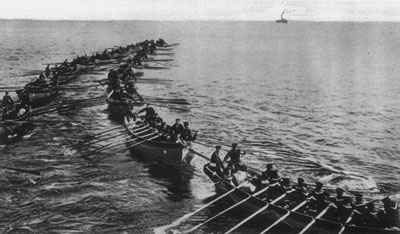
Siege of Tsingtao: The German torpedo boat S-90 slips out of Tsingtao harbor and fires a single torpedo, sinking the 3,000 ton Japanese cruiser Takachiho with the loss of 271 sailors. S-90 will not be able to run the blockade back to Tsingtao, and will submit to internment by the Chinese authorities after running short of fuel.
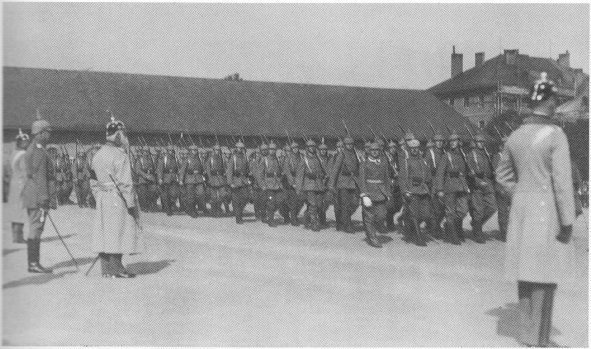
Click to Enlarge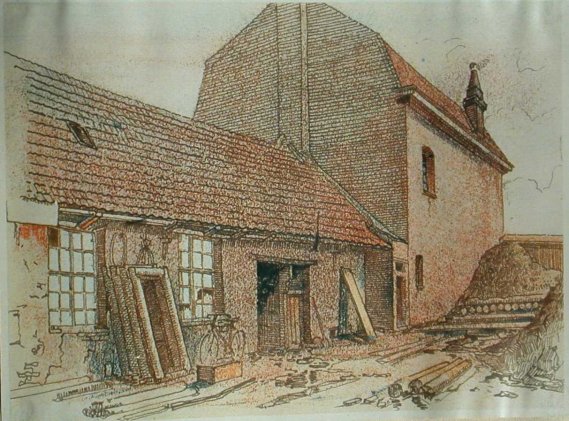
Fromelles Watercolor, 1915, by Hitler
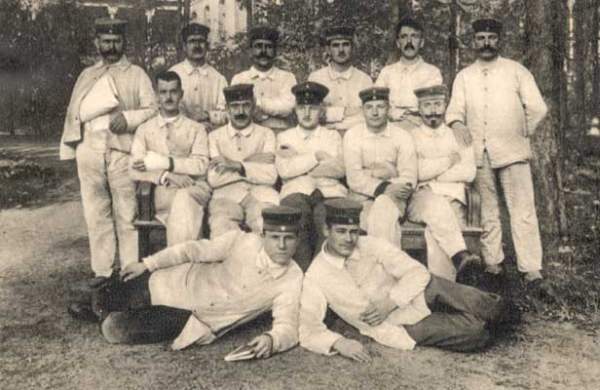
1916 List Regiment (Oct 9 - Dec 3): Hitler, who had been fighting almost continuously for two years, finds himself on a hospital train headed for a Red Cross hospital in Beelitz, near Berlin. While his wound is serious, he will recover quickly, and will later write Balthaser Brandmayer: "Am suffering from hunger-induced typhus because I cannot eat bread; additionally I am adamantly denied any sort of jam." [For further details, Click here.]
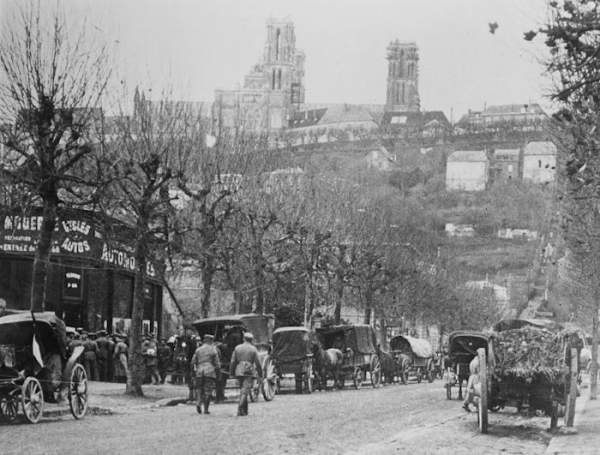
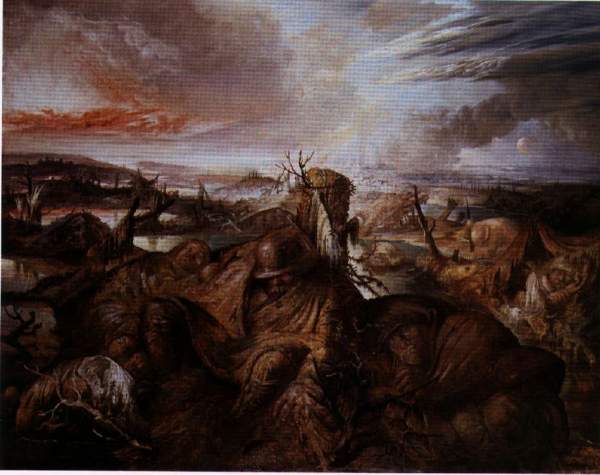
1918 World War I: Western Front: The British break through the German defenses on the Selle River. At the same time the Belgians and British under Belgian King Albert begin to move again in Flanders.
1918 World War I (Oct 15 - Nov 10): Gefreiter Adolf Hitler, blinded in a gas attack near Werwick on Oct 14, recovers in the Prussian Reserve Hospital at Pasewalk near Berlin. The doctors at this army hospital, on the cutting edge of medical treatments for gassed soldiers, provide Hitler with very good care, and his sight slowly and painfully begins to return to him over these few weeks. Hitler falls into a deep depression. After over four years on the front lines, his fighting days are over. In four years of war, the List Regiment has lost 3,754 dead, 8,795 wounded, with 678 taken prisoner. This is somewhat above the average for the German Armed Forces as a whole. [For further details, Click here.]1933 Various: Wittmoor
Zionism: Chaim Weizmann meets with King Albert of Belgium to discuss the German-Jewish refugee problem and the need for a Jewish homeland in Palestine. (THP)
1939 World War II: A German counterattack begins driving out the few remaining French troops in Germany, and by the following night, no French forces remain on German soil. (THP)
Countdown to Infamy: Three days after the successful attack on the British naval base at Scapa Flow by a U-boat, a German raid by four Luftwaffe Junkers Ju 88 bombers damages the battleship HMS Iron Duke. Note: Japanese military planners, studying the effects of these two attacks, will eventually combine both strategies when planning their own surprise attack on capital ships in a protected harbor.
[See: Countdown to Infamy: Timeline to Pearl Harbor.]1941 World War II: Various:
Barbarossa:
Konoye government falls:
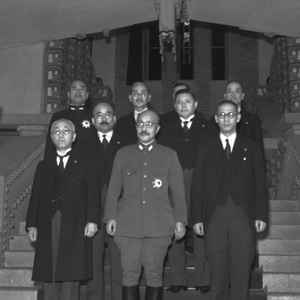
On this day in 1941, the government of Prince Fumimaro Konoye, prime minister of Japan, collapses, leaving little hope for peace in the Pacific.
Konoye, a lawyer by training and well studied in Western philosophy, literature, and economics, entered the Japanese Parliament's upper house by virtue of his princely status and immediately pursued a program of reform. High on his agenda was a reform of the army general staff in order to prevent its direct interference in foreign policy decisions. He also sought an increase in parliamentary power. An antifascist, Konoye championed an end to the militarism of Japanese political structures, especially in light of the war in Manchuria, which began in 1931.
Appointed prime minister in 1933, Konoye's first cabinet fell after full-blown war broke out between Japan and China. In 1940, Konoye was asked to form a second cabinet. But as he sought to contain the war with China, relations with the United States deteriorated, to the point where Japan was virtually surrounded by a U.S. military presence and threats of sanctions. On August 27, 1941, Konoye requested a summit with President Roosevelt in order to diminish heightening tensions. Envoys were exchanged, but no direct meeting with the president took place. (The U.S. government believed it could send the wrong message to China-and that Japan was on the losing end of that war anyway.)
In October, Konoye resigned because of increasing tension with his army minister, Tojo Hideki. Tojo succeeded Konoye as prime minister, holding on to his offices of army minister and war minister. Imperial Japan's foreign policy was now formally controlled by the military. After the bombing of Pearl Harbor, Konoye was put under military surveillance, his political career all but over until 1945, when the emperor considered sending him to Moscow to negotiate peace terms. That meeting never came off.
When Saipan fell to the U.S. Marines and Army, Tojo's government collapsed. Upon Japan's surrender, Tojo shot himself to prevent being taken prisoner by the United States. He lived and was tried by an international war-crimes tribunal—and hanged on December 22, 1948. As for Konoye, the grand irony of his career came when he was served with an arrest warrant by the U.S. occupying force for suspicion of war crimes. Rather than submit to arrest, he committed suicide by drinking poison. (History.com)
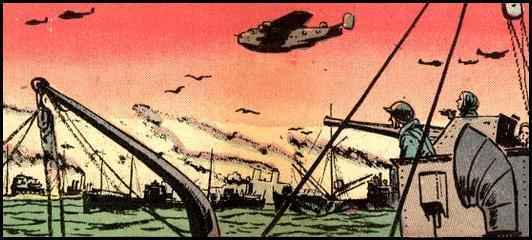
The United States destroyer USS Kearny, while escorting a convoy in the North Atlantic, drops depth charges after three merchant ships in her care are torpedoed. The Kearny continues to search for the elusive U-boat all night.
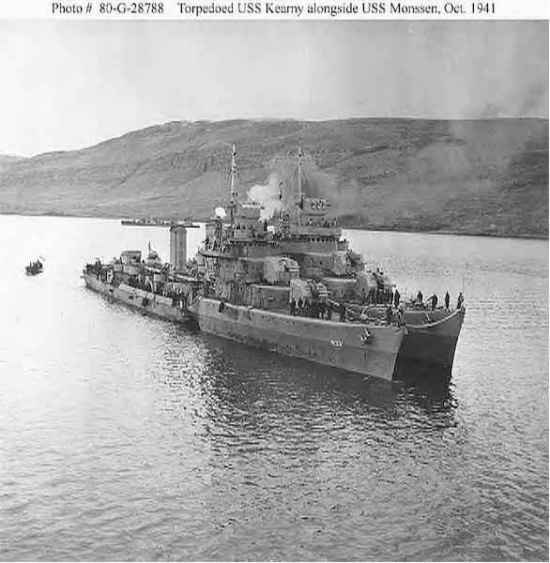
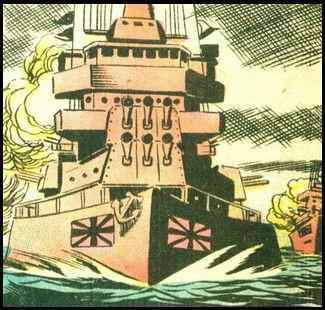
From the Duty Book of Captain Shigeshi Uchida:
General Tojo was ordered to form a new cabinet. As a result of the Nagato table maneuvers, Chief of Staff of the First Air Fleet went up to Tokyo and requested again that the whole strength of the First Air Fleet be used in the PH operation. Combined Fleet headquarters also requested to change the date of the Malaya landing. The idea of making a landing on Malaya on "X" day was not adequate, they asserted. As a result, the Naval General Staff made negotiations with the Army General Staff, but the latter did not consent. (Dillon)
Holocaust: The first deportation trains leave Germany for the ghettos in the east. (THP)
1944 World War II: Hungary: German forces successfully repulse heavy Soviet attacks near Debrecen.
1945 Various: From the first joint pastoral letter of the Archbishops and Bishops of Austria after liberation:
A war which has raged terribly and horribly, like none other in past epochs of the history of humanity is at an end . . . . At an end also is an intellectual battle, the goal of which was the destruction of Christianity and' Church among our people; a campaign of lies and treachery against truth and love, against divine and human rights, and against international law . . . .
Direct hostility to the Church was revealed in regulations against orders and monasteries, Catholic schools and institutions, against religious foundations and activities, against the ecclesiastical recreation centers and institutions; without the least rights to defend themselves they were declared enemies of both people and state and their existence destroyed. Religious instruction and education of children and adolescents were purposely limited, frequently entirely prevented. They encouraged in every manner all efforts hostile to religion and the Church and thus sought to rob the children and youth of our people of the most valuable treasure of holy faith and of true morality born of the Spirit of God. Unfortunately the attempt succeeded in innumerable cases to the permanent detriment of young people. Spiritual care of souls in churches and ecclesiastical houses, in hospitals and other institutions was seriously obstructed. It was made ineffectual in the Armed Forces and in the Labor Service, in the transfer of youth to the country and, beyond that, even in individual families and among numerous persons, to say nothing of the prohibition of spiritual ministration to people of another nationality and of other races. How often was the divine service as such, also sermons, missions, Communion days, retreats, processions, pilgrimages, restricted for the most impossible reasons and made entirely impossible! Catholic literature, newspapers, periodicals, church papers, religious writings were stopped, books and libraries destroyed.
What an injustice occurred in the dissolution of many Catholic societies, in the destruction of numerous church activities! Individual Catholic and Christian believers, whose religious confession was allegedly free, were spied upon, criticized on account of their belief, scorned on account of their Christian activity. How many religious officials, teachers, public and private employees, laborers, businessmen, and artisans, indeed, even peasants were put under pressure and terror! Many lost their jobs, some were pensioned off, others dismissed without pension, demoted, deprived of their real professional activity. Often enough such people who remained loyal to their convictions were discriminated against, condemned to hunger or tortured in concentration camps. Christianity and the Church were continually scorned and exposed to hatred. The apostasy movement found every assistance. Every opportunity was used to induce many to withdraw from the Church.
Argentina: Col. Juan Peron stages a coup, becoming absolute ruler.
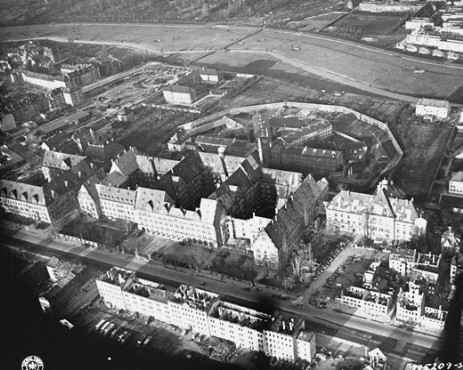
1946: From Spandau: The Secret Diaries, by Albert Speer:
In the afternoon brooms and mops are handed to Schirach, Hess, and me. We are told to follow a soldier who leads us into an empty gym. This is where the executions took place [See: Oct 16]. But the gallows has already been dismantled, the spot cleaned. Nevertheless, we are supposed to sweep and mop the floor. The lieutenant watches our reactions closely. I try hard to keep my composure. Hess comes to attention in front of a dark spot on the floor that looks like a large bloodstain; he raises his arm in the party salute.
1957: From an NCS (National Security Council) Memorandum:
As you know, the President [Eisenhower] issued a statement to the press, on October 9, that the first satellite test vehicle was planned to be launched in December, and that the first fully instrumented satellite vehicle would be launched in March, 1958.
In line with this statement, the President said, yesterday, that he wanted to be sure that the launching of the U.S. scientific satellite [would] proceed as planned and scheduled. He is, of course, conscious of the understandable desire of the scientists to perfect the instrumentation that goes into the satellite. Nevertheless, he made very plain that, any efforts further to perfect such scientific instrumentation, should not be permitted to delay the planned launching schedule.

1960 TIME Magazine reviews I Aim at the Stars:
It explodes in a splatter of platitudes about the moral dereliction of the scientific community--personified in von Braun. The movie makers, nervous perhaps about possible public reaction to von Braun's Nazi record, and the responsibility he shares for the V-2 attacks on London, have leaned over backwards to stress his war guilt, with the unhappy result that the hero comes off as a jolly accomplice in mass murder; an affable fanatic who cares everything about rockets, and nothing about the people they happen to kill. In the end, his moral indifference is shown to be dubiously justified by his scientific success. Von Braun possibly has grounds for a libel suit, but then he might do better to ignore the picture. So might everybody else.
Edited by Levi Bookin (Copy editor) Click to join 3rdReichStudies Disclaimer: This site includes diverse and controversial materials--such as excerpts from the writings of racists and anti-Semites--so that its readers can learn the nature and extent of hate and anti-Semitic discourse. It is our sincere belief that only the informed citizen can prevail over the ignorance of Racialist "thought." Far from approving these writings, this site condemns racism in all of its forms and manifestations.
levi.bookin@gmail.com










Fair Use Notice: This site may contain copyrighted material the use of which has not always been specifically authorized by the copyright owner. We are making such material available in our efforts to advance understanding of historical, political, human rights, economic, democracy, scientific, environmental, and social justice issues, etc. We believe this constitutes a "fair use" of any such copyrighted material as provided for in section 107 of the US Copyright Law. In accordance with Title 17 U.S.C. Section 107, the material on this site is distributed without profit to those who have expressed a prior interest in receiving the included information for research and educational purposes. If you wish to use copyrighted material from this site for purposes of your own that go beyond 'fair use', you must obtain permission from the copyright owner.
Please Note: The list-owner and the moderator of 3rdReichStudies are not responsible for, and do not necessarily approve of, the random ads placed on our pages by our web server. They are the unfortunate price one pays for a 'free' website.



